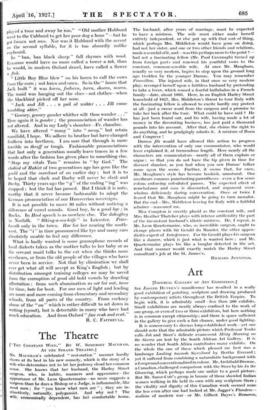The Theatre THE CONSTANT WIFE." BY W. SOMERSET MAT:Gil:LAI. AT
TliE STEAM) THEATRE.] MR. MAUGHAM'S celebrated " restoration " manner hardly shows at its best in his new comedy, which is the story of a wife who determines not to let her jealousy cloud her common sense. She knows that her husband, the Harley Street surgeon, who, in habits, manners and appearance—the appearance of Mr. Leon Quartermaine—no more suggests a surgeon than he does a Bishop or a Judge, is inflammable, like most men ; for " you know what men. are " ;. they are in- stinctively, naturally, polygamist. And why not'? The Wife, economically dependent, has hei camfoitable hoine. The husband, after years of marriage, must be expected to have a mistress. The wife must either make herself entirely independent, or else put up with that sort of thing, which perhaps Mrs. Middleton would have gone on doing, had not her sister, and one or two other friends and relations, made a scandal of it, and—was this perhaps more to the point f- had not a fascinating fellow (Mr. Paul Cavanagh) turned up from foreign parts and renewed his youthful vows to the constant, common-sensible wife. At once Mr. Maugham, usually so very modern, begins to step upon the ground long ago trodden by the younger Dumas. You may remember Franc/Ma. The injured wife, in that once so very modern play, revenged herself upon a faithless husband by pretending to take a lover, which roused a fearful hullabaloo in a French family—date, about 1893. Here, in an English Harley Street household of 1927, Mrs. Middleton's threat to tour Italy with the fascinating fellow is allowed to excite hardly any protest at all—just a swear word from the surgeon and a promise to take her back after the tour. What could he have said ? He has just been found out, and his wife, having made a lot of money in the decorating business, has just paid a thousand pounds into his account. After that, she claims the right to do anything, and he grudgingly admits it. A mixture of Ibsen and Congreve !
Dumas fits would have allowed this action to progress with the intervention of only one commentator, who would have explained it, at tremendous length. Here nearly all the characters are commentators—nearly all of them explain or argue ; so that you do not have the tip given in time for discreet slumber, as you had when you saw Dumas' talker come upon the scene. Further, it seems that, for once, Mr. Maugham's style has become bookish, unnatural. One overhears commas punctuating parentheses—even a few semi- colons enforcing calculated pauses. The expected effect of nonchalance and case is discounted, and argument over- whelms deliciously daring conversation. Once or twice I feared that Mr. Maugham might be going to turn moralist. But the end—Mrs. Middleton leaving for Italy with a faithful admirer—reassured me.
Miss Compton is sweetly placid as the constant wife, and Miss Heather Thatcher plays with intense artificiality the part of the inconstant husband's idiotic mistress. He, I repeat, is Mr. Leon Quartermaine, who, as incredible surgeon, ought to change places with Sir Gerald du Maurier, the other appen- dicitis expert of Interference. For Sir Gerald plays his surgeon like a dancer, which is just what is wanted here ; and Mr. Quartennaine plays his like a burglar detected in the act. And that manner would exactly match the Harley Street consultant's job at the St. James's.
RICHARD JENNINGS.


































 Previous page
Previous page